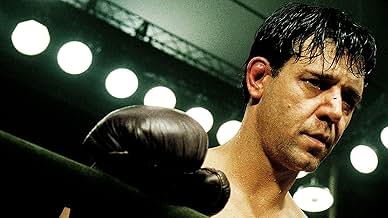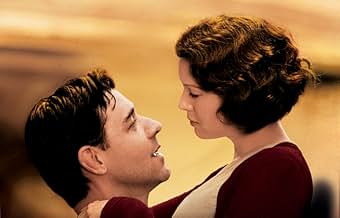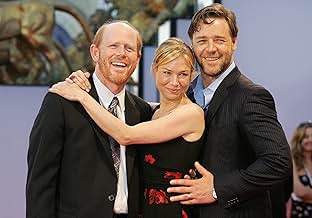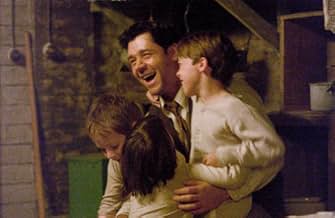La vita di James Braddock, un pugile apparentemente fallito che è diventato un campione e una fonte di ispirazione negli anni trenta.La vita di James Braddock, un pugile apparentemente fallito che è diventato un campione e una fonte di ispirazione negli anni trenta.La vita di James Braddock, un pugile apparentemente fallito che è diventato un campione e una fonte di ispirazione negli anni trenta.
- Regia
- Sceneggiatura
- Star
- Candidato a 3 Oscar
- 16 vittorie e 45 candidature totali
Recensioni in evidenza
Ron Howard teams with Russell Crowe (James J. Braddock) again and shows they can repeat with a winner. Like him as a person or not, Crowe puts forth another finely tuned, very convincing performance. Unlike in real life, he can be quite humble and sympathetic while beating the heck out of people. Really, his character is affecting, especially in his scenes with Braddock's children, and may be fairly reflective of the actual person of Braddock. (The fight game at that time, or any time, was not for saints but, whatever.) Renee Zellweger, who is not my favorite except for a brilliant portrayal in Cold Mountain, plays the wife effectively and mirrors the emotions for the females in the audience. (If my observations at the showing are typical, women fans will spend time alternately heading their eyes and virtually cheering out loud for Braddock/Crowe.)
There are a number of good supporting actors but Paul Giamatti strikes again! He plays the manager who supports Braddock through thick and thin and his character recalls the era better than anyone in the film. I don't know what kind of research he did for this role but his Joe Gould is the archetypal boxing manager of the time or, at least, our cinema image of one. Here's hoping he pulled some big bucks for a role for once.
(You will certainly recognize Bruce McGill, as the seemingly hard-hearted fight promoter who could care less about Braddock but really doesn't want to see him get killed in the ring, from many movie and TV appearances where he is always reliable and who may be remembered from an early exposure as "D-Day" in Animal House.)
The story of a family in the midst of the Great Depression was as compelling as the boxing story. The solid family man played by Russell gives us a much needed role model. The historical and socio-economic background was powerfully shown and greatly added to the audience's involvement and is particularly relevant to today. This is a classic film.
As for the NON-Baer parts of the film, they are great. The look of the 1930s is exceptional--much more realistic than you often see in films. Also, the acting is terrific, the film VERY engaging and the story of Braddock very compelling. Without the misrepresentation of Baer's in the story, I would have given this one a 10. Really....it's that compelling and they did a great job. The acting, direction, designs...everything but the writing was perfect.
By the way, this isn't so much a complaint as an observation. In this movie, like practically EVERY other boxing movie, there is hardly any defense (such as blocked shots) in the boxing matches--punch after punch that lands on the opponent. If fights REALLY were like this, they'd rarely go beyond the first round!
These films share in common not just a documentary-like approach to boxing or a superficial biopic. They also portray the human side of a modern gladiator and the culture that produced him. In the case of "Cinderella Man," we are given a detailed and heart-rending portrait of the Great Depression in American. The story of the gentleman pugilist James J. Braddock is the backdrop to the larger drama of Americans' struggle in the 1930s.
Russell Crowe provides a brilliant interpretation of Braddock, capturing the decency of a man whose career as a boxer would appear to have peaked at just the wrong time prior to the Crash of 1929. After that momentous event, Braddock's boxing went into decline just like the lives of millions of Americans. The scenes of Braddock and his family living in squalid conditions and with uncertainty about such basics as heat and electricity were carefully developed in the film. Renée Zellweger was outstanding as Mae, the caring but feisty wife of Braddock. Paul Giamatti was also excellent as Braddock's handler-manager, Joe Gould. Joe tries to keep up appearances by sporting fancy clothes. But in one revealing scene in the film when we see the interior of Joe's ostensibly swanky apartment, there is no fancy furniture other than a dowdy table and some flimsy deck chairs. Everyone is reeling from the Depression. In the depiction of the massive unemployment, the "Hoovervilles" of the homeless residing in Central Park, and the desperate need for Americans for an optimistic icon like Braddock to raise their spirits, the film truly captured the tragedy of the Great American Depression.
The film's director Ron Howard emphasized close-ups throughout the film with uneven results. In many of the boxing sequences, the close-ups and rapid editing made it difficult tell the fighters apart. The close-ups continued even into the domestic scenes and the outdoor sequences depicting Braddock working as a longshoreman. The film's dark cinematography conveyed the bleakness of the Depression years, but it worked against bringing out the buoyant spirit of Braddock himself and the optimism that he instilled in others. As a director, Howard's strength is not in film artistry or technique. As apparent in this and other films, his gift lies in narrative storytelling and the development of dramatic character.
Indeed, the characters and the story were the strong points of "Cinderella Man." Much credit should go to Cliff Hollingsworth for a screenplay that included thoughtful dialogue, humor, and multi-dimensional characters. Daniel Orlandi also merits praise for the brilliant costumes that helped to recreate the period of the early 1930s.
But the heart of this film experience is Russell Crowe's screen portrayal of Braddock. It was the colorful sportswriter and raconteur Damon Runyan who coined the nickname of "Cinderella Man" for Braddock. However, the real James J. Braddock was more than lucky. It was his strength of character in and out of the ring that captivated America. One of the most moving scenes of the film was a heated argument between Braddock and his wife Mae where Braddock insists that even in the most difficult of times, he would refuse to be separated from his children. As a boxer, he was fearless. But he demonstrated even more courage in fighting for family valuesa lesson from which we can learn a great deal today in reflecting on this sensitive film.
Lo sapevi?
- QuizTo film the final fight, the seats were filled with 15,000 blow-up dummies with masks and hats.
- BlooperThe receipt that Jimmy Braddock gives at the welfare office is about $50 off from the actual amount that Braddock had borrowed. Russell Crowe pointed this out to the director who decided to 'leave it in to prove that it's just a movie'.
- Citazioni
Jim Braddock: You think you're telling me something? Like, what, boxing is dangerous, something like that? You don't think working triple shifts and at night on a scaffold isn't just as likely to get a man killed? What about all those guys who died last week living in cardboard shacks to save on rent money just to feed their family, 'cause guys like you have not quite figured out a way yet to make money off of watching that guy die? But in my profession - and it is my profession - I'm a little more fortunate.
- Curiosità sui creditiBefore the title appears the following: "In all the history of the boxing game, you'll find no human interest story to compare with the life narrative of James J. Braddock." - Damon Runyon (1936)
- ConnessioniFeatured in HBO First Look: Cinderella Man (2005)
- Colonne sonoreShim-Me-Sha-Wabble
Written by Spencer Williams
Performed by Miff Mole and His Molers
Courtesy of Columbia Records
By arrangement with Sony BMG Music Licensing
I più visti
- How long is Cinderella Man?Powered by Alexa
- What are the pieces of artistic license taken by the movie?
Dettagli
Botteghino
- Budget
- 88.000.000 USD (previsto)
- Lordo Stati Uniti e Canada
- 61.649.911 USD
- Fine settimana di apertura Stati Uniti e Canada
- 18.320.205 USD
- 5 giu 2005
- Lordo in tutto il mondo
- 108.539.911 USD
- Tempo di esecuzione2 ore 24 minuti
- Mix di suoni
- Proporzioni
- 2.39 : 1
Contribuisci a questa pagina







































